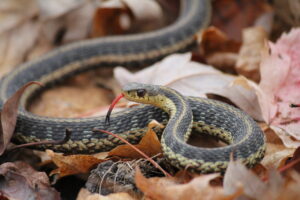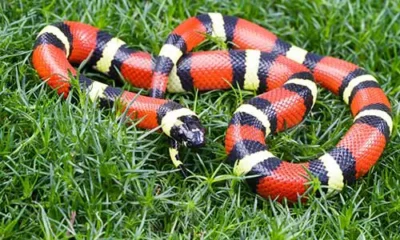Does a garter snake bite hurt? Garter snakes are commonly found across North America and are known for their relatively mild temperament. While they are not venomous and their bites are generally harmless to humans, some people may still wonder about the pain associated with a garter snake bite.
A garter snake bite is generally considered to be mild and non-venomous to humans. The majority of people who have been bitten by a garter snake report minimal pain, akin to a sharp pinch or a small prick from a needle. The bite may result in slight redness or swelling around the area of the bite, but serious complications are rare.
However, individual experiences can vary based on factors such as the size and age of the snake, the location of the bite, and the sensitivity of the person’s skin. While a garter snake bite is typically not something to be overly concerned about, it’s always a good idea to clean the bite area with soap and water and monitor it for any signs of infection.
Does a garter snake bite hurt?

Garter snakes are generally not aggressive and usually avoid biting unless they feel threatened or cornered. If a garter snake does bite, it typically feels like a small pinch or a minor scratch. Their teeth are quite small and not designed to cause significant harm to humans.
The bite of a garter snake is not particularly painful, and it usually does not result in any serious injury. However, some people may experience a mild reaction to the bite, such as slight swelling or redness at the bite site.
It’s worth noting that while garter snake bites are generally harmless, it’s essential to clean the bite area with soap and water to prevent any potential infection. If you are bitten by a snake and are unsure of the species or if you experience any unusual symptoms, it’s always best to seek medical advice.
Overall, while a garter snake bite may be startling, it is typically not painful or dangerous, and most people recover without any complications.
Characteristics of Garter Snakes
Garter snakes are a group of non-venomous snakes that belong to the genus Thamnophis. They are widespread across North America and are known for their distinct appearance and behavior. Here are some key characteristics of garter snakes:
- Appearance: Garter snakes typically have a slender body with a pattern of stripes or blotches running along their back. The coloration can vary widely, ranging from green, brown, yellow, to black, often with contrasting stripes.
- Size: They are generally small to medium-sized snakes, with adults ranging from 18 to 48 inches (45 to 122 cm) in length, depending on the species.
- Habitat: Garter snakes are adaptable and can be found in a variety of habitats, including forests, meadows, wetlands, and even urban areas. They are often found near water sources like ponds, streams, and marshes.
- Diet: These snakes are carnivorous and primarily feed on a diet of insects, earthworms, small amphibians, and fish. Some larger species may also consume small mammals and birds.
- Behavior: Garter snakes are active during the day (diurnal) and are generally solitary creatures. They are excellent swimmers and climbers, capable of moving quickly both on land and in water.
- Reproduction: Garter snakes are ovoviviparous, meaning they give birth to live young rather than laying eggs. Females typically give birth to a dozen or more baby snakes, known as neonates, in late summer.
- Defense Mechanisms: When threatened, garter snakes may release a foul-smelling musk from their cloaca as a defense mechanism. They may also flatten their bodies, puff up, or strike, although they are generally non-aggressive towards humans.
- Non-venomous: Garter snakes are not venomous to humans. While they do have small teeth and can bite if provoked, their bite is generally harmless and not painful.
Overall, garter snakes are fascinating creatures that play an essential role in their ecosystems by helping control populations of small prey animals. They are often appreciated by gardeners for their pest control abilities and are generally considered beneficial snakes to have around.
Understanding Garter Snake Bites
Garter snakes are non-venomous snakes, which means their bites are generally harmless to humans. However, they may bite if they feel threatened or cornered. Understanding garter snake bites can help you know what to do if you or someone else is bitten.
Characteristics of Garter Snake Bites:
- Pain Level: Garter snake bites are usually minor and may feel like a small pinch or scratch. The pain is generally mild and short-lived.
- Symptoms: The bite site may show slight swelling, redness, or puncture marks. In rare cases, some people may experience a mild allergic reaction, but serious symptoms are uncommon.
- Treatment:
- Clean the Wound: Wash the bite area with soap and water to reduce the risk of infection.
- Apply Antiseptic: Applying an antiseptic ointment can further help prevent infection.
- Monitor for Infection: Keep an eye on the bite site for any signs of infection, such as increased swelling, redness, or pus formation. If you notice these symptoms, seek medical attention.
What to Do If Bitten:
- Stay Calm: Try to remain calm to minimize the spread of venom, even though garter snakes are non-venomous.
- Gently Remove the Snake: If possible, safely remove the snake from the bite area to prevent additional bites.
- Clean the Bite: Follow the treatment steps mentioned above to clean and care for the wound.
- Monitor for Symptoms: Keep an eye on the bite site and your overall condition. Seek medical advice if you experience severe pain, swelling, or other unusual symptoms.
Prevention:
- Avoid Provoking Snakes: Garter snakes usually bite when they feel threatened or frightened. Avoid handling or disturbing them in their natural habitat.
- Wear Protective Gear: If you need to work in areas where snakes are present, consider wearing protective clothing like gloves and boots.
- Educate Yourself: Knowing how to identify garter snakes and understanding their behavior can help you avoid potential encounters.
While garter snake bites are generally harmless, it’s essential to clean and care for the wound properly to prevent infection. If you have any concerns or experience unusual symptoms after a snake bite, seek medical advice promptly.
Physical Impact of a Garter Snake Bite

The physical impact of a garter snake bite is typically minimal due to the non-venomous nature of these snakes. Here’s a breakdown of what you can generally expect from a garter snake bite:
Immediate Impact:
- Pain: The bite may cause a slight pinch or scratch-like sensation. Most people describe the pain as mild and short-lived.
- Redness and Swelling: The area around the bite may become slightly red and swollen, which is a common reaction to any puncture wound.
- Puncture Marks: You may see two small puncture marks where the snake’s teeth entered the skin. These marks are usually minor and may not bleed much.
Potential Complications:
- Allergic Reaction: While rare, some people may have an allergic reaction to the snake’s saliva, leading to increased swelling, itching, or rash around the bite area.
- Infection: Any open wound, including a snake bite, carries a risk of bacterial infection. It’s essential to clean the wound thoroughly and monitor it for signs of infection, such as increased redness, swelling, or pus.
Long-Term Impact:
- Scarring: In most cases, garter snake bites heal without leaving any significant scars. However, the size and depth of the puncture wounds may vary, and some minor scarring may occur.
- Psychological Impact: Some people may experience fear or anxiety about snakes after being bitten, even though garter snake bites are generally harmless. Counseling or education about snakes can help alleviate these fears.
Treatment and Care:
- First Aid: Clean the bite area with soap and water as soon as possible to reduce the risk of infection.
- Antiseptic: Apply an antiseptic ointment to the wound to further prevent infection.
- Monitoring: Keep an eye on the bite site for any signs of infection or allergic reaction. If you notice increasing pain, swelling, or other concerning symptoms, seek medical attention.
The physical impact of a garter snake bite is usually minor and does not cause significant harm. However, it’s crucial to clean and care for the wound properly to minimize the risk of infection and other complications. If you have any concerns or experience severe symptoms after a snake bite, it’s always best to consult with a healthcare professional.
Medical Concerns After a Garter Snake Bite

If you’ve been bitten by a garter snake, it’s important to take the appropriate steps to ensure your safety and well-being. While garter snakes are generally harmless to humans and their bites are not usually venomous, there are still some potential concerns to be aware of:
- Immediate Care:
- Wash the bite area with soap and water to prevent infection.
- Apply an antiseptic ointment to the bite area.
- Cover the bite with a clean bandage.
- Monitoring for Symptoms:
- Keep an eye on the bite area for any signs of infection, such as redness, swelling, warmth, or pus.
- Monitor your general health for symptoms like nausea, vomiting, dizziness, or difficulty breathing, which could indicate an allergic reaction.
- Seek Medical Attention:
- If you experience severe pain, swelling, or any signs of infection, seek medical attention immediately.
- If you have a known allergy to snake bites or are unsure about the species of snake that bit you, it’s best to seek medical evaluation to rule out any potential complications.
- Prevention:
- Avoid handling wild snakes if possible, and always wear appropriate protective clothing (e.g., gloves) if handling is necessary.
- Educate yourself about local snake species and their behaviors to reduce the risk of snake bites.
Remember, while garter snake bites are typically not life-threatening, it’s always better to err on the side of caution and seek medical advice if you have any concerns or develop unusual symptoms after a bite.
How to avoid getting bitten
Avoiding snake bites, including those from garter snakes, involves taking some precautions when you’re in areas where snakes may be present. Here are some tips to help you avoid getting bitten:
- Awareness:
- Be aware of your surroundings, especially when walking in areas where snakes may be hiding, such as tall grass, under rocks, or near bodies of water.
- Wear Protective Clothing:
- Wear long pants, boots, and thick socks when walking in areas where snakes may be present.
- Consider wearing leather gloves if you are working in areas where you may encounter snakes.
- Avoid Provoking Snakes:
- Do not attempt to handle, poke, or provoke snakes in the wild.
- Give snakes plenty of space and do not try to approach or catch them.
- Stay on Designated Paths:
- Stick to well-traveled paths and avoid walking through tall grass or dense vegetation where snakes may be hiding.
- Use a Flashlight at Night:
- If you’re out at night, use a flashlight to illuminate your path and watch out for snakes.
- Inspect Your Surroundings:
- Before sitting down or placing your hands in areas where you can’t see, inspect the area for snakes or signs of their presence.
- Educate Yourself:
- Learn about the types of snakes that are common in your area, their habitats, and behaviors.
- Understand the difference between venomous and non-venomous snakes and know how to identify them.
- Avoid Disturbing Snake Habitats:
- Be mindful when camping or hiking to avoid disturbing areas where snakes may be nesting or hibernating.
By being vigilant and taking these precautions, you can reduce your risk of encountering and getting bitten by snakes. Remember, most snakes are not aggressive and will only bite when they feel threatened or provoked.
Conclusion
We have answered the question does a garter snake bite hurt on this page. A garter snake bite typically causes minimal pain and is generally harmless to humans. The bite may result in slight redness or irritation at the bite site but usually does not require medical attention. While a garter snake bite may startle or surprise you, it is not known for causing significant pain or serious injury.

